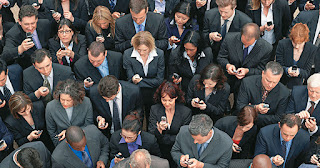We all talk about the technological revolution being witness about how it is transforming our environment. First there were the travel agencies, then the taxis , later the tourist apartments rental, o online shopping, online education...
However, one question remains to be answered: how will health disruption affect health systems and their professionals and users?
From my point of view we can know something:
the change will be progressive and will come from the successive implementation of technologies that provide advances in different aspects of clinical practice, management and organization of resources. We also know that health systems are huge organisations with high inertia and that health professionals tend to have a conservative profile when it comes to incorporating new technologies. Before we adopt them we need to have scientific evidence that is both useful and beneficial to the patient and society. The problem is that scientific evidence is costly and very slow. The average time for a new molecule to become an accepted drug is about ten years, which is unreasonable for products and services in the digital sphere.
Perhaps it can be said that the disruption of healthcare technology began a few decades ago with the introduction of electronic medical record systems that allowed health services to begin to be digitised. The growing volumes of data favoured the creation of information and management systems with which to get to know what was being done and establish roadmaps towards the organisation's objectives.
At present, there is a lot of recorded information that is not yielded and a lot of free text that remains qualitative and unusable. What will happen when there are semantic algorithms that can quantify both the information written in history and the information spoken in consultation?
Another advance front will come from the 5G mobile telephony technology that will generalize immersive virtual reality scenarios that will allow health professionals and patients to interact remotely in high quality teleconsultations. It will also be possible to interact with bots or artificial avatars that will allow increasingly purified degrees of conversation.
The advances in wereables will also allow an increasing number of variables to be recorded: temperature, heart rate, blood pressure, arterial oxygen saturation, physical activity, sleep... which, when added to the facial analyses, can make inferences in emotional states, quantification of pain and functional impotence and many other possibilities.
With this amount of information it will be necessary to create personal artificial intelligence units to guard, analyse and manage all the biometric data that each individual produces, connected in turn to those of their responsible health professionals who will look after them. Just as the progressive introduction of autonomous cars will completely modify mobility as we now know it, the implementation of personal health assistants will do the same with the provision of health services.
The revolution will be led by the citizens themselves by having better technological services that will progressively generate more biometric information. They will know how they sleep, how they move and how they should move, they will know their degrees of cardiovascular risk, they will detect early arrhythmias, hypertensions and diabetes, they will have alerts of possible incipient pathology... all of which will produce a foreseeable exponential increase in the need for health services to check or act on the data presented. Against all odds it will not be the chronically and complex patients who end up dismantling the current health systems, it will be the healthy citizens eager to enjoy better health.
The hypothesis presented here attempts to help generate a global reflection in health professionals and at the social level. Given that it is the advances and proposals of the market, led by the increasingly powerful technological companies, that seem to be taking the initiative to develop knowledge societies, what role should professionals play with technical knowledge?, what courses of action would produce more social benefit?, will they coincide with those that produce more personal benefit?
It would seem clever for health professionals to play an active role
in the design and development of the new tools and the new digital
architectures that will be built. The conversation with computer
engineers, developers and designers should include healthcare
professionals, patients and managers. In order to be able to create
social value, it is intelligent for us to add to the strength of the
market itself a plus of collective intelligence based on the best
possible scientific evidence and on values such as justice and social
solidarity. It is true that everything in health is going to change, but
it is also possible to work together so that this change would be oriented
towards an scenario that benefits us most as a society.
Avatar creado digitalmente
Todos hablamos de la revolución tecnológica y somos testigos de cómo está transformando nuestro entorno. Primero fueron las agencias de viaje, luego los taxis y el alquiler de pisos turísticos, las compras online, la educación a distancia...
Sin embargo una pregunta queda por responder: ¿cómo afectará la disrupción sanitaria a los sistemas sanitarios y a sus profesionales y usuarios?
Desde mi punto de vista algo podemos saber, por ejemplo que el cambio será progresivo y vendrá de la mano de la sucesiva implementación de tecnologías que provean avances en distintos aspecto de la práctica clínica, la gestión y la organización de recursos. También sabemos que los sistemas sanitarios son enormes organizaciones con grades inercias y que los profesionales sanitarios solemos tener un perfil conservador a la hora de incorporar nuevas tecnologías. Antes de adoptarlas necesitamos disponer de pruebas científicas que sean útiles a la par que beneficiosas para el paciente y la sociedad. El problema reside en que la evidencia científica es costosa y muy lenta. El tiempo medio para que una nueva molécula se constituya en fármaco aceptado es de diez años, plazo inasumible para los productos y servicios de la esfera digital.
Quizá se pueda decir que la disrupción tecnológica sanitaria comenzó hace unas décadas con la instauración de los sistemas de historia clínica electrónica que permitieron empezar a digitalizar la prestación de servicios. Los crecientes volúmenes de datos favorecieron la creación de sistemas de información y de gestión con los que conseguir saber qué se estaba haciendo y establecer hojas de rutas hacia objetivos de la organización.
En el momento actual hay mucha información registrada a la que no se saca un rendimiento y otra mucha en texto libre que sigue siendo cualitativa y no es susceptible de utilizar. ¿Qué pasará cuando haya algoritmos semánticos que puedan cuantificar tanto la información escrita en la historia como la hablada en consulta?
Otro frente de avance vendrá de la mano de la tecnología 5G de telefonía movil que generalizarán los escenarios de realidad virtual inmersiva que permitirán interactuar a profesionales sanitarios y pacientes a distancia en teleconsultas de alta calidad. Así mismo será posible interactuar con bots o avatares artificiales que permitirán grados cada vez más depurados de conversación.
Los avances en wereables permitirán a su vez registrar un número creciente de variables: temperatura, ritmo cardiaco, tensión arterial, saturación arterial de oxígeno, actividad física, sueño... que cuando añadan los análisis faciales podrán hacer inferencias en estados emocionales, cuantificación de dolor e impotencia funcional y otras muchas posibilidades.
Con tal cantidad de información será necesario crear unidades de inteligencia artificial personales que custodien, analicen y gestionen todos los datos biométricos que cada individuo produzca conectadas a su vez a las de sus profesionales de salud responsables que velarán por ellas. Así como la progresiva instauración de los coches autónomos modificará completamente la movilidad tal y como ahora la conocemos, la implementación de asistentes personales de salud harán lo mismo con la prestación de servicios sanitarios.
La revolución será liderada por los propios ciudadanos al disponer de mejores servicios tecnológicos que progresivamente irán generando más información biométrica. Sabrán cómo duermen, cómo se mueven y cómo deberían moverse, sabrán sus grados de riesgo cardiovascular, detectarán de forma precoz arritmias, hipertensiones y diabetes, tendrán alertas de posible patología incipiente... todo lo cual producirá un previsible aumento exponencial de la necesidad de servicios sanitarios que chequeen, comprueben o actúen ante los datos presentados. Contra todo pronóstico no serán los enfermos crónicos y complejos los que terminen desmontando los actuales sistemas sanitarios, serán los ciudadanos sanos deseosos de disfrutar de una mejor salud.
La hipótesis presentada trata de servir de ayuda para generar en un primer momento una reflexión global en los profesionales de la salud y en un segundo a nivel social. Dado que son los avances y propuestas del mercado, liderado por las cada vez más poderosas compañías tecnológicas, las que parece que están llevando la iniciativa de desarrollo de las sociedades del conocimiento, ¿qué papel deberían jugar los profesionales con conocimiento técnico?, ¿qué cursos de acción producirían más beneficio social?, ¿coincidirán con los que produzcan más beneficio personal?
Parecería sensato que los profesionales de la salud tuvieran un rol activo en el diseño y desarrollo de las nuevas herramientas y en las nuevas arquitecturas digitales que se irán construyendo. La conversación con ingenieros informáticos, desarrolladores y diseñadores debería incluir a sanitarios, pacientes y gestores. Para poder crear valor social es inteligente que a la propia fuerza del mercado le añadamos un plus de inteligencia colectiva basada en la mejor evidencia científica posible y en valores como la justicia y la solidaridad social. Es verdad que todo en salud va a cambiar pero también lo es que es posible trabajar juntos para que dicho cambio se oriente hacia el escenario que como sociedad más nos beneficie.
卫生技术中断
我们都在谈论技术革命是如何改变我们环境的见证。首先是旅行社,然后是出租车,后来是旅游公寓出租,网上购物,网上教育……
然而,还有一个问题有待回答:健康破坏将如何影响卫生系统及其专业人员和用户?
从我的观点来看,我们可以知道一些事情:这种变化将是渐进的,并且将来自于技术的连续实施,这些技术在临床实践、资源管理和组织资源的不同方面提供了进展。我们还知道,卫生系统是具有高惯性的大型组织,并且卫生专业人员在纳入新技术时往往具有保守的姿态。在我们采用它们之前,我们需要有科学证据,这些证据既有益又有益于患者和社会。问题在于科学证据昂贵而且非常缓慢。新分子成为公认药物的平均时间约为十年,这对于数字领域的产品和服务是不合理的。
也许可以说,几十年前,随着允许医疗服务开始数字化的电子病历系统的引入,医疗技术的中断开始了。日益增长的数据量有利于建立信息和管理系统,以便了解正在做什么,并建立实现本组织目标的路线图。
目前,有许多记录信息未被生成,还有许多免费文本仍旧是定性的和不可用的。如果有语义算法可以量化历史记录中的信息和咨询中所说的信息,会发生什么?
另一个前沿将来自5G移动电话技术,它将推广沉浸式虚拟现实场景,允许卫生专业人员和患者在高质量远程咨询中远程交互。它也可能与机器人或人造化身互动,这将允许越来越纯洁的对话程度。
这些技术的发展也将允许记录越来越多的变量:温度、心率、血压、动脉血氧饱和度、身体活动、睡眠……当添加到面部分析中时,它可以在情绪状态、疼痛和功能性阳萎的量化以及许多其他可能性中进行推断。
有了这些大量的信息,就有必要建立个人人工智能单元,以便保护、分析和管理每个个体产生的所有生物特征数据,这些数据又与负责照顾他们的卫生专业人员的数据相联系。正如我们现在所知道的,自主汽车的逐步引入将完全改变机动性,个人健康助理的实施也将在提供健康服务方面起到同样的作用。
这场革命将由公民自己领导,通过提供更好的技术服务,逐步产生更多的生物特征信息。他们会知道他们如何睡觉,如何移动以及应该如何移动,他们会知道他们的心血管危险程度,他们会发现早期心律失常,高血压和糖尿病,他们会有可能的早期病理学警报……所有这些都将产生可预见的指数增长,需要卫生服务来检查或对所呈现的数据采取行动。尽管存在种种可能性,但最终摧毁现有卫生系统的不是慢性和复杂的患者,而是渴望享有更好健康的健康公民。
这里提出的假设试图帮助卫生专业人员和社会层面产生全球性反映。鉴于由日益强大的技术公司领导的市场的进步和建议似乎正在主动发展知识社会,专业人员应该在技术知识方面发挥什么作用?什么样的行动课程会产生更多的社会效益?他们会与那些产生更多个人利益的人重合吗?
对于卫生专业人员来说,在设计和开发将要建立的新工具和新的数字体系结构方面发挥积极作用似乎是明智的。与计算机工程师、开发人员和设计人员的对话应该包括医疗专业人员、患者和管理人员。为了能够创造社会价值,我们明智的做法是,根据尽可能好的科学证据和诸如正义和社会团结的价值观,为市场本身的力量加上集体智慧。的确,一切健康的事物都会改变,但也有可能一起努力,使这种改变朝着正确的方向发展。
Este artículo se publica simultáneamente en el blog:
gestionclinicavarela.blogspot.com

















.jpg)